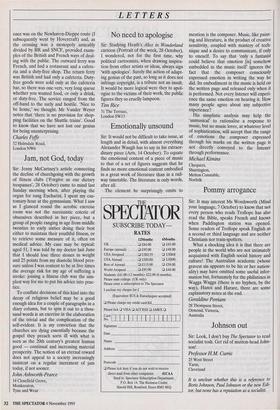Jam, not God, today
Sir: Jenny McCartney's article connecting the decline of churchgoing with the growth of fitness clubs (`Forgive us our dietary trespasses', 28 October) came to mind last Sunday morning when, after playing the organ for sung Eucharist, I spent my cus- tomary hour at the gymnasium. What I saw as I glanced round the aerobic exercise room was not the narcissistic coterie of obsessives described in her piece, but a group of people ranging in age from middle twenties to early sixties doing their best either to maintain their youthful fitness, or to retrieve some measure of it, often on medical advice. My case may be typical: aged 51, I was told by my doctor last June that I should lose three stones in weight and 25 points from my diastolic blood pres- sure unless I was content to be at five times the average risk for my age of suffering a stroke: joining a fitness club was the sim- plest way for me to put his advice into prac- tice.
To conflate decisions of this kind into the decay of religious belief may be a good enough idea for a couple of paragraphs in a diary column, but to spin it out to a thou- sand words is an exercise in the elaboration of the trivial and the complication of the self-evident. It is my conviction that the churches are dying essentially because the gospel they preach sorts ill with what is seen as the 20th century's greatest human good — continual and increasing material prosperity. The notion of an eternal reward does not appeal to a society increasingly insistent on a regular increment of jam today, if not sooner.
John Ashworth-Pearce
14 Closefield Grove, Monkseaton, Tyne and Wear










































































 Previous page
Previous page